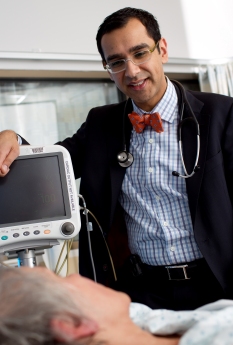
Dr. Sean Virani, director of the Cardiac Function Clinic and Heart Failure Services at VGH, and cardiovascular oncology researcher
For many breast cancer patients, chemotherapy drugs can literally be lifesaving, but they are also known to cause heart muscle damage in up to 60 per cent of patients. Known as cardiotoxicity, side effects includes scarring, abnormal contraction and relaxation, and even heart failure.
Protecting the heart in patients undergoing chemotherapy is critical, as damage caused to this organ is the main limitation on maximum drug doses in certain cancer treatments. Being able to protect the heart will enable oncologists to treat patients with higher, more aggressive doses of chemotherapy when needed, and improve long-term health outcomes for breast cancer survivors.
Dr. Sean Virani, director of the Cardiac Function Clinic and Heart Failure Services at VGH, and leading researcher in the emerging area of cardiovascular oncology, is co-leading a study on the effectiveness of a drug called eplerenone at protecting the heart from the harmful effects of chemotherapy. Eplerenone is a medication traditionally used to prevent or reverses heart damage after a heart attack.
Cardiotoxicity is linked to a patient’s dose of chemotherapy – the higher the dose, the greater the chances of side effects. Dr. Virani’s study, through the new Cardiovascular Oncology Clinic at VGH, will examine 78 newly diagnosed breast cancer patients undergoing treatment with doxobucin. Half will receive eplerenone, the others a placebo. Recruitment for the study is through physician referral at the BC Cancer agency.
Dr. Virani’s study is funded by the Canadian Cancer Society, with support for the new Cardiovascular Oncology Clinic through VGH & UBC Hospital Foundation.
For more information on VCH Research studies, click here.
